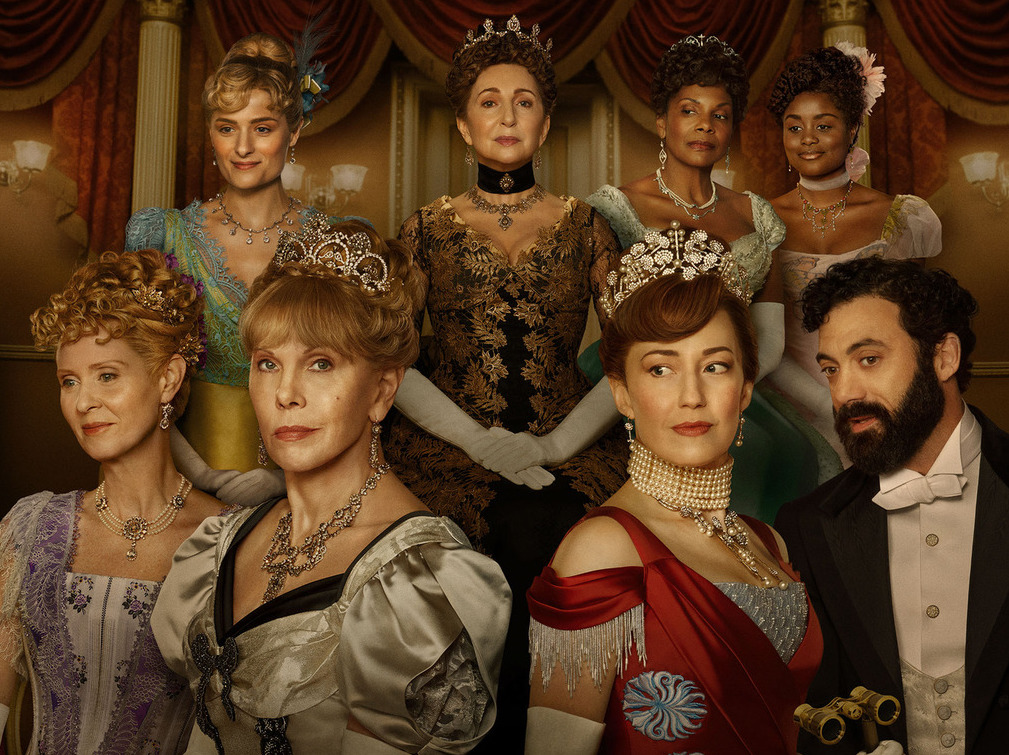
November 16, 2023

Source: HBO MAX
Okay, you fans of such classics as Age of Innocence, House of Mirth, and Ethan Frome, Julian Fellowes is no Edith Wharton, but for the dregs of what’s left of society today, he’ll do. He’s a Brit, a funny little fellow—pun intended—whom I sat next to at a London gentlemen’s club luncheon long ago. He had not as yet found fame and fortune for his Downton Abbey TV series, and he seemed awfully anxious to please. “My wife is lady in waiting to Princess Michael of Kent,” he pronounced. “Poor you,” said I, “are you bragging or complaining?” (The Michael woman is an Austrian climber of the worst kind, the type who kicks downward and brownnoses upward.)
Fellowes has come to mind because I watched The Gilded Age on television while here in the Big Bagel, and I must say it amused me because even Fellowes has gone woke and installed black characters in the series. By this I mean the blacks in the series are well-mannered, responsible, wise, and more intelligent than most of the white characters on the show. I found the series fun to watch, although way, way overdone. The collision of old money and new is at the center, but actually Fellowes has it wrong: He’s judging as a Brit, and on that rainy island class has always been measured by ownership of inherited land rather than cash. America was always about money because being a newly established nation, and people were not anxious to be related to Pocahontas.
And new money in America became and becomes old money very quickly. Forty-five or so years ago, William Astor came to my house in the English countryside and said something catty about my living in his uncle’s old house. I reminded him where I came from and that my family had nothing to do with German butchers, which was the profession of the first Astor to make it big in America. (William’s wife, a very nice woman, whispered to me, “Well done.”)
Hence on The Gilded Age the Astor lady is taken very seriously, as is some clown by the name of McAllister. I liked the costumes—way overdone—but in today’s rag-wearing, down-market celebrity crowd, it was a blessing. As were the pneumatic ladies of the late 19th century when compared with today’s unsexy skeletal types who pass for females. Some of the servant characters on the series remind me of that wonderful Japanese soldier, Hiroo Onoda, who only surrendered in 1974, having hidden in the jungles of Malaysia for thirty years, true to his emperor.
The new rich on the TV series are portrayed having made their fortunes in the railroad, copper, and steel industries, and, needless to say, the tycoons are not particularly concerned with their workers, who are practically starving to death. They figure to bribe their leaders and keep them working for peanuts.
What I’d like to know is how is it that capitalism has survived with communist running dogs writing against the system since it was first invented? When even ass-kissing people like Fellowes write such rubbish, I wonder even more. The Brits have always been obsessed with class, whereas the Americans obsess over money. The ruling class in Britain has always put others in their place by the manner of speaking, codifying a system that the upper classes could be identified with. Nancy Mitford, who was very bitchy, at times very mean, and very upper-class, wrote a famous bestseller identifying the code. For example: A member of the upper class—or U—will never say “couch,” but “sofa.” Non-U words include “mirror”—for U, “looking glass”—and “serviette” (non-U) for “napkin” (U). And so on. The only one I picked up when the book came out in the early ’60s was “rich” (U) instead of “wealthy” (non-U).
But you knew all that rubbish, you Takimag readers; it was invented by desperate Brits after the war, having lost their empire and most of their women to rich Yankees. Still, I wouldn’t feel sorry about the British upper classes—not yet, anyway. There are about 600 aristocratic families on that tight little isle, and most of them are doing better than okay, as they say in Texas. When Brideshead Revisited, the Evelyn Waugh classic, ran on American television for something like two months, Americans saw up close the desperate craving of Charles Ryder to be part of the Sebastian Flyte aristocratic family. The man who directed the production was a friend of mine, and he told me how he had to downplay Ryder’s homosexuality in favor of his urge to belong to an aristocratic family.
I think this fellow Fellowes suffers from the same obsession. But he’s made a fortune from it, so there must be something good in name-dropping and writing about the rich. The obsession with upward mobility is omnipresent in both Britain and America, as well as in most countries. Apparently not so much in Africa, where dictators prefer to watch their people starving rather than being upwardly mobile. I think Fellowes should write an African saga next, the Dark Continent being the future of mankind.